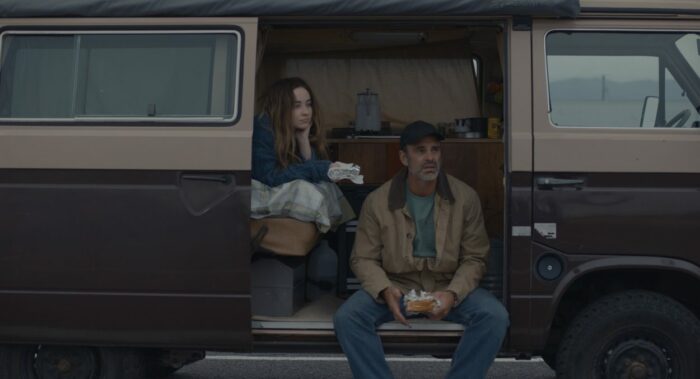When you watch the family drama The Short History of the Long Road, you would never guess Sabrina Carpenter is the same bubbly Disney Channel presence she is from Girl Meets World or Adventures in Babysitting. For this displaced character of Nola living off the grid and figuring out her life, there is no fizz. Only stern realities push this young woman. Equal to her privileged bully character in The Hate U Give, you would never guess Sabrina is also a vivacious pop star beyond the TV and movie screens in this type of film role requiring zero showy stages. This festival darling and award winner debuting June 16th on streaming platforms is a deeper test of potential magnitude.
When some charismatic personas go, as some would reductively call it, “unpretty” or “ugly” for a more natural or dramatic role, the results feel forced. With a little less makeup work and some shoddier clothes, the performer might put on the outer facade of adversity and expect the look to be enough. They will fail to exude the narrative hardship as if it manifested fully from within a true soul. For The Short Story of the Long Road, that is most certainly not Sabrina Carpenter. This film is a wonderful opportunity to celebrate her evolving talent.

The “low budget high experience” livelihood of Nola is one created by her father Clint, played by the silvered Steven Ogg of Snowpiercer and Westworld. They live off of the highways and by-ways inside of a 1984 Volkswagen Westfalia (van consultant Ryan Sellmeyer is a silent MVP of this movie). The familial duo does odd jobs and squats at parks and foreclosed houses. With skeptical takes on normal society, Clint values the practical, unrushed, and experiential as an education money can’t buy. Clint sees this personal culture as going back to the human roots as a migratory species and preaches “society would be much better off if we build an army of self-sufficient agitators.” He’s not wrong in many, many ways.
The ever-moving years of this rustic rambling have been formative for Nola. She couldn’t be closer to her father as they observe the world with different lenses and sing old road songs like “Come Along” by Maurice Williams and the Zodiacs without a cellular device in sight. The Short History of the Long Road does not always have the bounce of that song, but it does have the spirit.
The origin of this automotive adventure comes from Clint splitting away from Nola’s mother Cheryl (Maggie Siff of Billions and Sons of Anarchy), a woman Nola doesn’t remember and secretly longs to meet. As Clint laments “she zigged and we zagged.” There is most certainly freedom to be had under the stunning Southwest skies of New Mexico featured in the film and captured by cinematographer Cailin Yatsko, but Nola is at an inquisitive age to discover more traditions and personal history.
That said, living this isolated and hazardous way of traveling and living alone is not always easy and becomes much harder when Clint leaves the picture. Pearls of wisdom like “we wouldn’t get very far without knowing how to fix things” serve her only so far with an ancient and oil-bleeding motor home and her trusty makeshift jug-and-headlamp combo lantern. Soon, she is siphoning gas and trying to dine and ditch when the money runs out.

At those challenging lows, a beneficial array of people enter Nola’s life and personal journey. They include the caring churchgoer Marie (Rusty Schwimmer) who offers an adoptive family, an auto mechanic named Miguel (Danny Trejo) who lets her trade work hours in his shop for vehicle repairs, and a potential peer in the abused fellow teen Blue (Jashaun St. John) who envies Nola’s freedom. Each of these intersections, from the one-time passersby to the long-term relationship attempts, become character-building experiences for Nola.
The performances from Schwimmer, St. John, and especially Trejo, a professional movie tough guy, become endearing treats. Thinking back to Lesson #2, most would expect a pretty girl like Nola to be an easy target for accosting violence straight out of urban legends and crappy road movies and, thankfully, writer-director Ani Simon-Kennedy never considers exploitation on that level in The Short History of the Long Road. In this writer’s opinion, optimism that more people would help a traveler rather than abuse one is a fairer worldview and welcome stance.
There are no easy answers for this young woman. Each new human connection for Nola outside her father shows her slices of life beyond the looseness of her own. She can have a different way of doing things that others find reckless. New friends (and soon her own rediscovered mother) teach her a better course instead of taking momentary advantage of innocent and giving people. However, it’s not about fixing people, forced conformity, or removing brainwashing of any kind in Simon-Kennedy’s film. Forming empathy is the truer goal. Learning to accept charity and compassion doesn’t chip away at independence. They simply support and enhance the flexibility of that autonomy.

Guided by calm direction from Ani Simon-Kennedy, Carpenter, while green, never overacts. She’s not screaming for the balconies to show off. She nails the introverted pitch of her reserved Nola character. In scenes shared with the people Nola meets along the way, many of whom are more seasoned actors, Sabrina gives and takes with flow and patience. With a large enough reception, folks may come back to a film like this someday and point to it as a genesis point for Carpenter. She deserves that praise.
The title of The Short History of the Long Road is plain, simple, and true. This is but a small jaunt of a bigger journey for this broken family set to a steady score by M83’s Morgan Kibby. The flashbacks are just that: flashed for mere seconds. They show enough to throb the heart and that’s plenty. Any extended testimonials and cherished memories come out in small talk and stay small talk without a grand speech in earshot. What’s personal is personal and not for crowds. Big and lofty is the sky above it, not the grounded individual. Once again, that’s the wavelength: plain, simple, and true. Those are fitting and admirable qualities.



